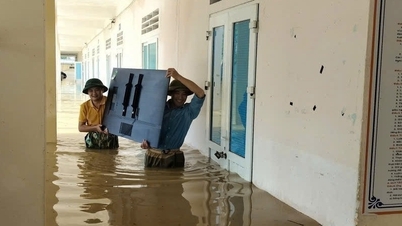The decision immediately caused a stir in public opinion with many opinions in support and against. The disagreement occurred for two main reasons. One is that assessment always plays a decisive role in measuring the effectiveness of training programs; two is that the quality of teaching and learning foreign languages (or specifically English) in Vietnam is always a burning issue.
The burning issues of teaching and learning foreign languages
The status of foreign languages in general, and English in particular, has increased significantly in just a few years, especially since the Ministry of Education and Training allowed the conversion of 4.0 IELTS or equivalent to 10 points for high school graduation. Public opinion has also repeatedly expressed concern about the "mushrooms growing after the rain" phenomenon of IELTS test preparation centers, or the fact that IELTS scores are becoming one of the criteria for assessing someone's level.

A foreign language lesson with foreigners for students in Ho Chi Minh City
The quality of teaching and learning foreign languages at the secondary level remains stagnant. Since 2008, the Ministry of Education and Training has implemented the National Foreign Language Project with the aim of improving the level of the people (especially the youth), but the pressing problems still exist. Secondary schools still focus on teaching vocabulary, grammar, and reading comprehension; language skills tests are only perfunctory; and most importantly, young people still cannot speak foreign languages fluently.
The nature of the high school graduation foreign language exam does not assess language skills, but mainly tests grammar and vocabulary. Although the exam has questions that indirectly test speaking and writing skills, the number and method of questions in these sections are still very limited, leading to the fact that just learning tips can help you do it correctly without having the equivalent language skills. In addition, the average score of the high school graduation English exam is still low and varies between regions and provinces.
Overcoming barriers if you want to change the way foreign languages are taught
Many people believe that the fact that foreign languages are no longer a compulsory subject in high school exams will reduce the pressure on both teachers and students, thereby making learning foreign languages more comfortable and enjoyable. Without being constrained by purely grammar and vocabulary tests, English teachers will have more opportunities for students to practice their language skills, and from there the overall quality of teaching will be improved.
Many experts also pointed out that because foreign language output standards are still mandatory for college and university students, young people still have to learn foreign languages to qualify for graduation; and to obtain international certificates, learning language skills is mandatory. From there, foreign language proficiency will generally improve.
These predictions are entirely possible with some prerequisites, and that is the challenge for the education industry.
Specifically, not requiring foreign language exams will give teachers more autonomy in terms of pedagogy. However, practical experience in Vietnam shows that in subjects that do not require exams, the situation of "teaching for the sake of it", "testing for fun" or "inflating academic scores" is very common. The core cause of this problem lies in three factors.

When foreign languages are no longer a compulsory subject in high school exams, both teachers and students need to overcome many barriers to truly move towards teaching and learning.
First, teachers are completely free from any pressure of "external assessment", meaning they teach, give questions, grade, and decide on scores.
Second, the policy of valuing achievements in many places will be a form of negative pressure that makes teachers "consider" how many points their students get so that they themselves will not be reprimanded. When a percentage of good and fair is predetermined and the right to decide the score is almost 100% in the hands of teachers, negativity is very likely to occur.
Another issue is that the Ministry of Education and Training has confirmed that the structure of the foreign language exam in the 2025-2030 period will still be multiple choice. This means that students who choose to take the foreign language exam will still have to learn grammar and vocabulary in the same way as before. So will teachers be "brave" enough to change the way they teach foreign languages?
Finally, teacher quality remains a big question. Are current primary school teachers competent enough to teach skills?
The role of foreign languages is increasingly important in the present. As globalization takes place at a dizzying speed through increasingly modern communication platforms, post-Covid-19 connection platforms develop strongly, and AI "invades" many fields; knowing a foreign language is an extremely big advantage for anyone in the world , not just Vietnamese citizens.
To make foreign language testing and assessment in high schools effective, as well as to turn it into a positive pressure, training programs, teacher quality, and education policies are still very big questions.
Source link


![[Photo] The 1st Congress of Phu Tho Provincial Party Committee, term 2025-2030](https://vphoto.vietnam.vn/thumb/1200x675/vietnam/resource/IMAGE/2025/9/30/1507da06216649bba8a1ce6251816820)
![[Photo] Panorama of the cable-stayed bridge, the final bottleneck of the Ben Luc-Long Thanh expressway](https://vphoto.vietnam.vn/thumb/1200x675/vietnam/resource/IMAGE/2025/9/30/391fdf21025541d6b2f092e49a17243f)

![[Photo] Solemn opening of the 12th Military Party Congress for the 2025-2030 term](https://vphoto.vietnam.vn/thumb/1200x675/vietnam/resource/IMAGE/2025/9/30/2cd383b3130d41a1a4b5ace0d5eb989d)
![[Photo] President Luong Cuong receives President of the Cuban National Assembly Esteban Lazo Hernandez](https://vphoto.vietnam.vn/thumb/1200x675/vietnam/resource/IMAGE/2025/9/30/4d38932911c24f6ea1936252bd5427fa)
![[Photo] General Secretary To Lam, Secretary of the Central Military Commission attends the 12th Party Congress of the Army](https://vphoto.vietnam.vn/thumb/1200x675/vietnam/resource/IMAGE/2025/9/30/9b63aaa37ddb472ead84e3870a8ae825)































































































Comment (0)